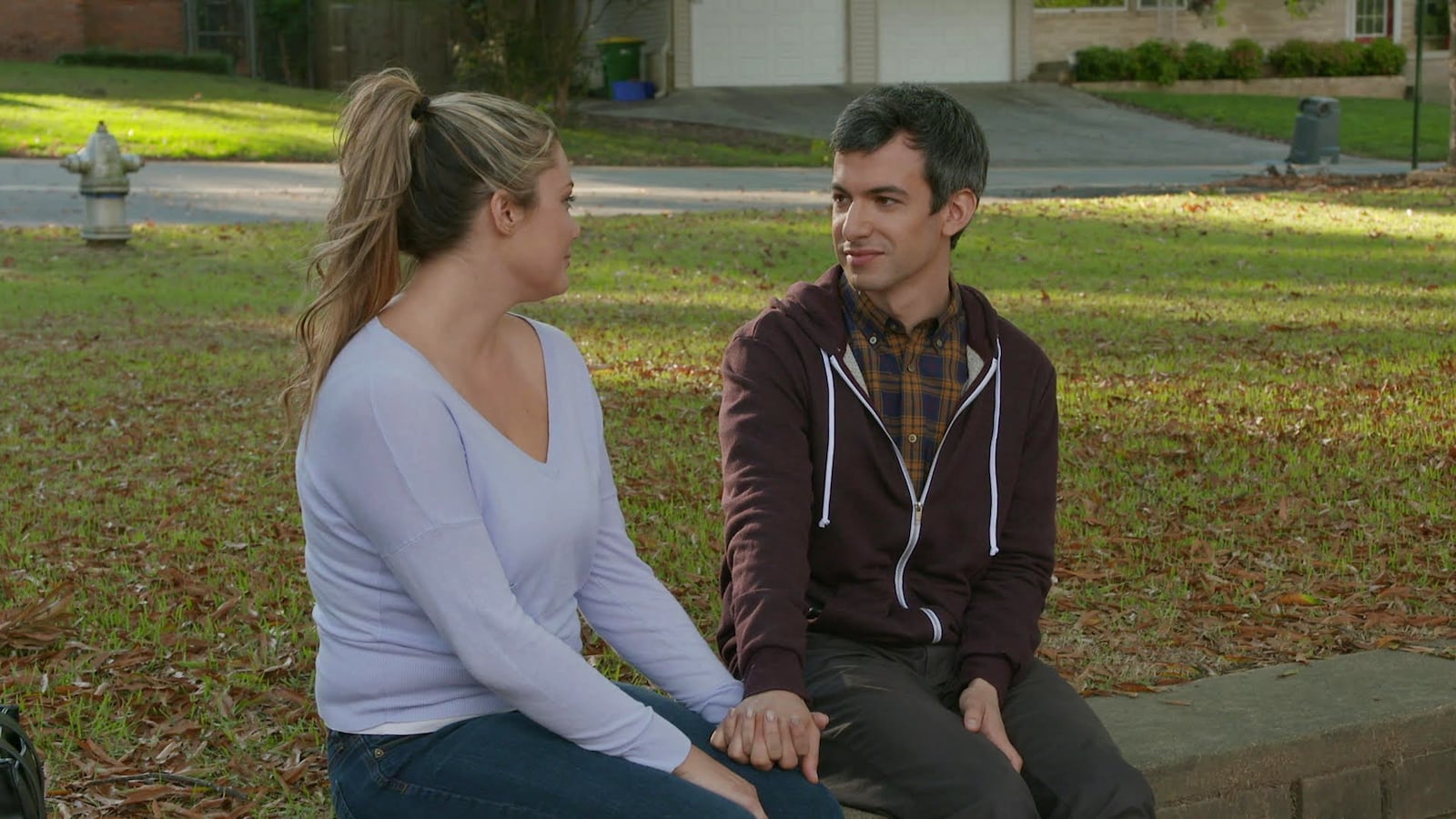The longer that I sit with the season four finale of Nathan Fielder’s Nathan for You, “Finding Frances,” the less certain I am of how I feel about it. It’s unquestionably one of the best TV episodes of the year, definitely the best standalone, and perhaps just as worthy of the argument over what counts as TV and what counts as a movie as the current debate raging over the most recent season of Twin Peaks. It’s just as much a meditation on love and the passage of time as Lynch’s latest work, and just as impossible to stop thinking about.
Over the course of almost two hours (nearly four times the length of a typical Nathan for You episode), Fielder attempts to reunite a purported Bill Gates impersonator, Bill Heath, with a woman named Frances, who he says is his lost love. The typical Nathan for You hijinks ensue, including pretending to be shooting a sequel to Mud and staging a high school reunion, but that absurdity isn’t the predominant thread in “Finding Frances.”
At first glance, the premise could easily be described as sweet. What’s sweeter than true love, after all? But the more that we learn about Bill—it seems that he philandered, and attempted to pressure Frances into making their relationship more intimate when she wasn’t comfortable with it—the more obvious it becomes that, given an unreliable narrator, we may be watching something play out through increasingly uncomfortable rose-colored glasses. When confronted with his past misbehaviors and present lies to Fielder (he isn’t a Bill Gates impersonator after all), he denies culpability, or otherwise avoids engaging in any discussion. For the most part, this leaves Fielder baffled.
If you’ve never seen the show before, the best way to describe the overall tone of it might be, “kind of mean, like funny-mean.” Nathan for You sends Fielder out as a consultant to struggling businesses and struggling people, and the solutions he offers them are invariably bonkers. While “Finding Frances” may now be the most well-known episode of the show (filmmaker Errol Morris wrote about it for The New Yorker, in case you need any idea of the scope of its effect), the prior Nathan for You standard-bearer—and a neat example of the ethos of the show—was “Dumb Starbucks.” In it, Fielder convinced the owner of a coffee shop to turn it into “Dumb Starbucks Coffee,” and to present it as an art installation to prevent any trouble with copyright laws.

Bill Heath and Nathan Fielder in “Finding Frances.”
Comedy CentralAs might be obvious, these scenarios usually have Fielder throwing the people he’s helping somewhat off-balance. (The Comedy Central show is listed as “cringe comedy” on Wikipedia.) Bill, however, is implacable. As Fielder comes up with gag after gag in an attempt to dig up Frances’ whereabouts, Bill goes along with every single one, revealing himself to be an increasingly complex character along the way.
His loneliness is palpable—Fielder notes that he’d continued visiting the studio at random intervals after his first appearance on the show in a previous season—and even more so as we see that it’s not just us, as an audience, who have been somehow duped. Memory is fallible, and memory tied to emotion even more so. We look upon our past selves with kindness or with contempt, but there’s no in-between. Bill lands in the former camp so firmly as to affect his present behavior. When it starts to look like they have a positive lead, he starts investing more and more in a fantasy in which she’ll leave her current husband to be with him. When Fielder hires an actress to act as a Frances stand-in to rehearse how Bill’s eventual reunion with her will go, he’s aggressive to a degree that’s uncomfortable to watch, putting a hand on the actress’s thigh and acting otherwise cavalier. It’s only when it’s suggested that he take the role of Frances and the actress play Bill that he starts to reconsider his behavior.
This is all made even more surreal by a parallel storyline that develops halfway through the episode: Fielder hires an escort named Maci (who is the one who judges Nathan for You to be “funny-mean”) to try to work on Bill’s people skills where women are concerned, and when Bill refuses (saying, in a moment that makes it particularly difficult to feel any sympathy towards him, “You gotta know what you’re sticking it in,” even though Fielder explains that the meeting is meant to be platonic), Fielder goes to meet Maci on his own.
As the episode progresses, they continue to meet, seeming to get to like each other more and more each time. In case the question of how much of this relationship is manufactured and how much of it is genuine hasn’t been driven home, “Finding Frances” closes on a drone shot of them sitting on a bench together, surrounded by the show’s crew. Nathan for You may be a docu-reality show, but Fielder is ultimately making a show. And Maci is literally paid to spend time with other people. We’re inclined to take the progression of their relationship as real because of the narrative couching, but the entire structure of the show around it throws a wrench into taking things at such a surface level.
It doesn’t help that the resolution of Bill’s storyline is one that begs a balm. Old dogs may be able to learn new tricks, but the window of time provided by a Nathan for You episode isn’t enough to turn around decades’ worth of navel-gazing. Bill and Frances’ reunion takes place via phone call, as Bill’s insistence that the camera crew come to the house with him puts Fielder off, and a call is how they settle the matter. Over the course of an excruciating few minutes, Bill continues to ask Frances, “Doesn’t my voice sound familiar to you?” and other leading questions as Frances continues to give him the same answer: “No.” Ultimately, he reveals himself, and their conversation ends with simple well wishes. No promise of any future meetings, no leaving her husband, no real acknowledgment of their shared past.
“The years go by,” Bill says, as he and Fielder sit in their car outside Frances’ house. “In the snap of a finger, they go by.” That’s that.
There are precious few other shows this year that I can think of that have managed to do so much so subtly, and so effectively. There are endless nettles to pick through when it comes to how we ought to be interpreting the end of the episode, and how much license we should be offering Bill—and Fielder, too—when it comes to their behavior towards others, but it’s not enough to discount how remarkable the rest of the episode is. Leading up to the episode’s airing, Fielder wrote, “If you only have time to watch one Nathan for You episode this season, tonight’s 2-hour finale wouldn’t be a bad choice.” I’d take it one step further and say: if you only have time to watch one Nathan for You episode, period, make it “Finding Frances.”






